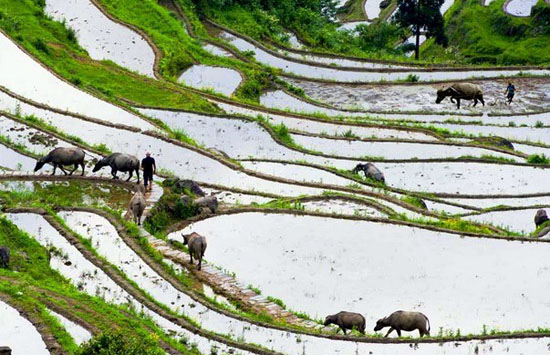Over the weekend, we entered the period of the ninth solar term, called Mang Zhong in Chinese. This begins around fifteen days before the Summer Solstice and the longest day of the year, when the Sun reaches a celestial longitude of 75°.
The most significant point about this solar term is that it marks the end of grain-growing conditions and serves as a reminder to farmers that this is the last chance to sow crops. The first character, Mang, means the ear or the tip of grain. The pronunciation, mang is very similar to the Chinese word for "busy"--Mang, so the name of this time period implies a double meaning of ‘when the grain is in the ear and the time when farmers are busy. The weather starts to become humid and hot, and the farmers face a battle against both weather and time while harvesting their produce.

The second character, Mang means to grow, plant, or cultivate. The most common crops that are harvested at this time are rice, cotton, and sometimes wheat amongst many others. It is a busy time for all parts of China, especially for those which grow rice. In Guizhou province, home to some of China’s most beautiful rice terraces, there is a saying that goes "Once the time of Mang Zhong has passed, there will be no use to planting anymore". People are therefore in a hurry to sow and cultivate their seeds to ripen them during the best season.
In ancient times, a common folk custom was to pay homage to the goddess of flowers while looking forward to the next harvest. Vivid descriptions of the ceremonies and celebrations are depicted in many classic Chinese texts, for example Cao Xueqin's "Dream of the Red Chamber" (Chapter 28). Today however, the descriptions of farewell feasts; with gifts and offerings often woven from flower petals or willow branches or beautiful silks, can only be left to the imagination. Different provinces may have their own particular celebrations. In Anhui, steamed dumplings are made from the freshly grown flour and made into different shapes or sometimes are colored. It is a time of hard work, but an extremely important one, and the sight of fields bursting with life is certainly one to behold.
Healthy Living Tips
The best food to eat during "Grain in Ear" period, as suggested by Chinese doctors, ismulberry. Around two thousand years ago, mulberry had already been considered asroyal food and among the folk, it was called the "Holy Fruit". It has abundant glucose,cane sugar, Vitamin A, B and C and many mineral substances and is very good forhuman's heart, liver and kidney.

![Diseases, Symptoms, tcm, [tcmwindow.com]](/uploadFile/adImg/2015/11/11/f5cbfcc0-4df5-4646-9b9a-f316651a0199.jpg)





